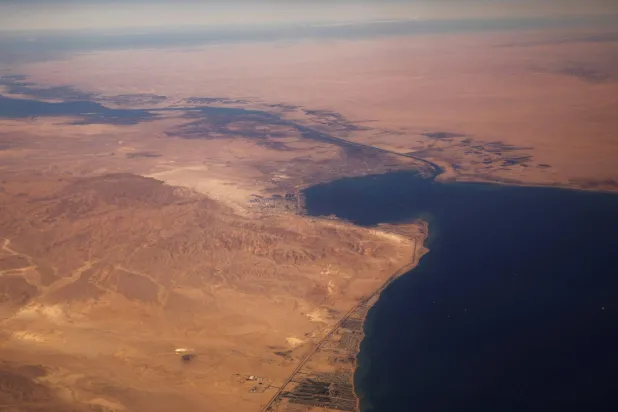Egypt is developing plans for the resumption of trade through the Suez Canal, encouraged by a ceasefire agreement between Israel and Hamas and hopes that the Houthi attacks on the Red Sea cease completely.
Suez Canal revenues dropped 45.5% to $3.6 billion during fiscal year 2024/2025, compared to $6.6 billion a year earlier, the Central Bank of Egypt (CBE) said in its balance of payments report.
The decline was attributed to a 55.1% drop in net tonnage to 482.8 million tons and a 38.5% decrease in the number of transiting ships to around 12,400 vessels.
On Saturday, Egyptian President Abdel Fattah El-Sisi affirmed the country’s commitment to creating a favorable investment climate and overcoming any challenges shipping and logistics companies may face in Egypt.
During a meeting with the Chairman of the Board of Directors of the A.P. Møller-Mærsk Group, Robert Mærsk Uggla, he noted the state’s aspiration to increase the group’s investments and presence in the Egyptian market.
The meeting was held in the presence of Prime Minister Moustafa Madbouly, Chairman of the Suez Canal Authority Admiral Ossama Rabiee and Chief Group Representative A.P. Møller- Mærsk in the Middle East & North Africa Hany El Nady.
El-Sisi stressed the deep strategic partnership between the Egyptian state, represented by the Suez Canal Authority, and the Mærsk Group and lauded the Group’s efforts in Egypt with regard to studying the production and supply of ships with green fuel, which enhances Egypt’s position as a regional hub for the Group’s operations, both in the field of container trade and green fuel production.
The President also expressed Egypt’s appreciation for the Group’s efforts in the ongoing expansion of the Suez Canal Container Terminal in the East Port Said Port, according to Spokesman for the Presidency, Mohamed El-Shennawy.
For his part, the Group’s chairman thanked El-Sisi for the vital role played by Egypt, under his leadership, in reaching an agreement to stop the war in Gaza and hosting the Sharm El-Sheikh peace summit.
Mærsk Uggla stressed that these efforts will have positive repercussions for regional stability and shipping traffic in the Red Sea.
He also emphasized the Group’s commitment to continuing cooperation with the Suez Canal Authority, as it is the most important global shipping lifeline for supply chains and provides a more efficient and less costly route compared to alternative routes.
He then praised the advanced services offered by the canal to transiting vessels.
“Mærsk looked forward to supporting Egypt’s efforts to reconstruct the Gaza Strip, noting that the East Port Said Port can play a pivotal role in this regard,” Mærsk Uggla said.
He also highlighted the continued support the Group’s operations in Egypt receive, stressing that the scope of the Group’s investments and projects in Egypt reflects its firm confidence in the Egyptian economic environment and its stability.
The Group’s chairman praised the Suez Canal Authority’s significant development in terms of infrastructure and technical capabilities, which qualifies Egypt to become a leading regional hub for supplying ships with green fuel.
For his part, Rabiee expressed his appreciation for the fruitful cooperation between the SCA and Mærsk and stressed that the Authority looked forward to expanding the partnership with Mærsk by establishing more joint projects that contribute to supporting the national economy and enhancing Egypt’s position as a global hub for maritime and logistics services.
If the ceasefire between Israel and Hamas holds, shipping traffic in the Suez Canal is expected to return early next year.
The Suez Canal, the shortest route connecting Europe and Asia, saves approximately about 30 days of travel time by allowing ships to avoid the longer journey around Africa’s Cape of Good Hope, which can take 70 days.
